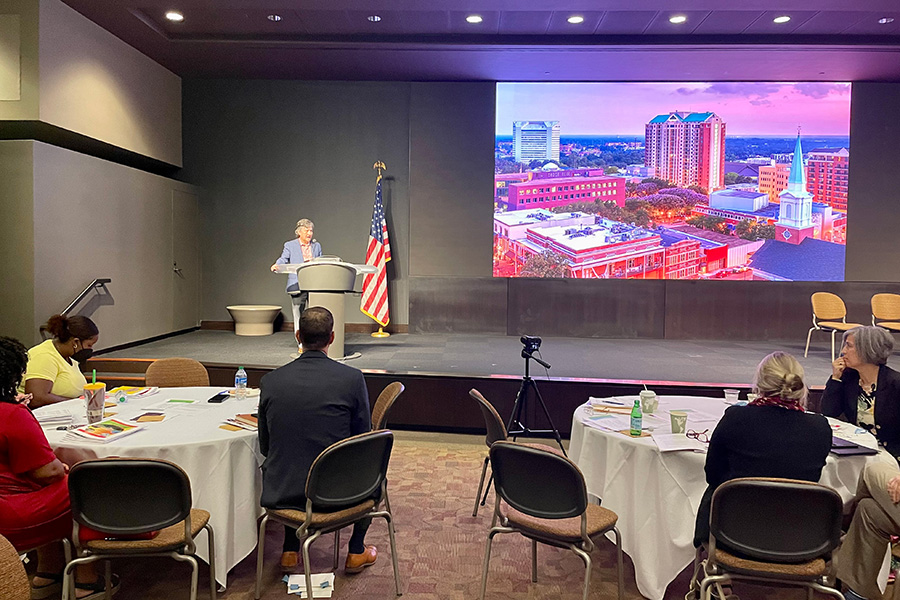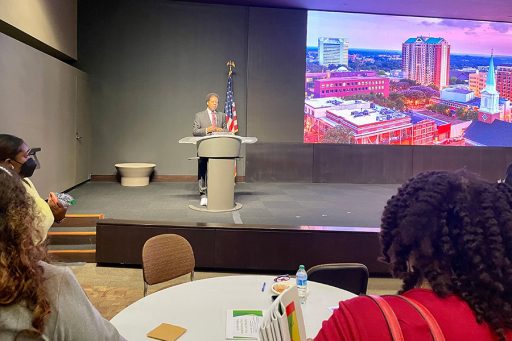
Florida State University this week welcomed a large gathering of community leaders and residents in a continued exploration of solutions for a particularly impoverished area of Leon County.
The fifth meeting of the 32304+ Prosperity for All Summit brought together Leon County health, government, nonprofit and law-enforcement officials, plus officials from FSU and Florida A&M University, for a three-hour workshop that focused on people and communities in zip code 32304 – which the Florida Chamber of Commerce has declared the poorest in the state.

“There’s no joy that 32304 leads the state in impoverished conditions,” said Bill Proctor, chairman of the Leon County Board of County Commissioners. “We want to change that.”
FSU hosted this week’s event at the Turnbull Florida State Conference Center, where Provost Jim Clark hailed the initiative for its use of quantitative and qualitative data to develop “a sophisticated picture of what we’re facing.”
Clark also emphasized FSU as a partner.
“Part of what we’re trying to do at the university through our many centers and institutes and through our colleges is to build a knowledge base and research approaches that have great relevance to development of public policy and to practice approaches that can make a difference,” he told a room of more than 100 attendees.
In an interview afterward, Clark noted the university’s tradition as an engaged community member and FSU President Richard McCullough’s emphasis on the study and research of poverty, especially among underrepresented populations.
Clark, who served as dean of FSU’s College of Social Work before becoming provost in January, pointed to university resources “that demonstrate strong commitment to the local community.” He cited numerous university bodies and faculty members who remain active in anti-poverty work and research.
“One thing I’ve been impressed with ever since I came here in 2015 is that Florida State University is deeply loved by the community, and FSU loves the community back,” Clark said. “We want to demonstrate that concretely more and more as the years go by in terms of really important issues to everyday people, like health care, like economic development, like working on more robust social services systems and affecting public policy in ways that benefit everybody.”
Clark added: “I think the summit today showed that the community’s really helping and interested in an even deeper partnership with Florida State University.”
Indeed, said Commissioner Proctor.
“Our hopes are that FSU will be an agency … for ideas to confront, combat and beat down poverty,” he said.
Stakeholders launched the 32304+ Prosperity for All Summit in 2019 after the Florida Chamber of Commerce identified 32304 as the state’s poorest zip code. The zip code runs from central Tallahassee into northwestern Leon County.
The initiative conducted four summits in 2019. This week’s event marked the first summit since the beginning of the COVID-19 pandemic.
Attendees included representatives of the Akbar Law Firm; the Crorie Consulting Group; Forward from Here; the Children’s Services Council of Leon County; United Way of the Big Bend; the Oasis Center; the Capital Area Community Action Agency; the Second Harvest of the Big Bend; Elder Care Services; the Javacya Arts Conservatory; ReThink Energy Florida; the Florida Civil Rights Museum; the Big Bend Minority Chamber of Commerce; the Council on the Status of Men and Boys; CareerSource Capital Region; the Bond Community Health Center; Big Bend Habitat for Humanity; the Community Foundation of North Florida; United Partners for Human Services; Graceful Solutions; and the Greater Tallahassee Chamber of Commerce.
The summit launched with an aim to better understand the challenges of poverty and economic inequality. This week’s event focused on recognition of the work getting done and on commitments for coordinated community-based and evidence-informed efforts – underscoring the initiative’s progress.
“We want to be No. 1 in football, basketball, track, women’s soccer,” Commissioner Proctor said. “You don’t want to be No. 1 in poverty.”




